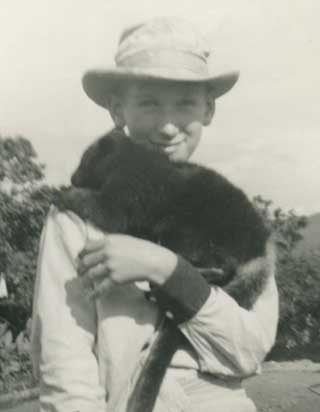Insights on Creation Care from a Papuan Boyhood by Dan Graves
Fallen humanity everywhere have misused each other, the environment, and living creatures.

[Left: the author as a boy with a pet tree wallaby]
In our issue on creation care, Christian History 119, we noted that it is common for secular environmentalists to blame Christians for destruction of earth’s environment. In actuality, humans were ruining their living spaces and abusing living creatures long before Christianity emerged. Don Story, in his pro-environmentalist book Should Christians be Environmentalists?, devotes a chapter to examples of pre-Christian cultures which damaged their environment. How much of the destruction of the Sahara forests was owing to human exploitation and how much to climate change can be disputed, but either way the result was desert.
I have seen with my own eyes how a pre-Christian culture damaged its own space. While a boy I lived in Papua, New Guinea. In 1960 my family were among the first non-Papuans allowed into the Wiru Valley, one of the last restricted areas opened to mission work. When we trekked across it the first time, we found that its central region was already largely denuded of trees through slash-and-burn gardening. Only mountains slopes, river gorges, and unsettled areas at the edge of the valley remained heavily forested. No Christians had taught these people to ruin their environment.
And in my lifetime, non-Christian societies have had a terrible track record. Dumping chemical waste in eastern Europe, atheist communist regimes created a toxic mess in lakes that may never be cleaned up. Farther east, Chernobyl will be radioactive for the forseeable future. In China, the Yellow River is pouring toxins into the sea. The Bible has things to say about the environment. None has been more arresting to me than the second and third verses of Hosea 4 which attribute the death of fish and birds to human wickedness.
The way the Wirus killed pigs was atrocious. Two men grabbed a pig by its legs and passed it squealing over live coals until all of its bristles were singed off. After this torture was complete, a man would pulp the bones of the animal's head with many non-lethal blows, the wretched brute screaming in agony and terror the whole time. Dad asked why they did it and was told it gave the meat a better flavor. Nothing in their paradigm made them capable of producing their own Upton Sinclair to write with indignation at inhumane slaughter, or an Anna Sewell to encourage kindness to domesticated animals. I have seen boys torment a captured bird or tree wallaby for twenty minutes on end, poking a stick again and again into the helpless creature’s eyes. My astonishment was at how quietly the animals bore such abuse.
When the elderly became an encumbrance, some families took them into the forest and abandoned them with a couple of days worth of food. One boy came to my mom in agony for medical treatment, his right foot the color of a pork roast. He had experienced an epileptic seizure during which his foot strayed into a fire. Rather than pull him out, the villagers left him where he lay. Because of what I had seen, I would unhesitatingly reject the myth of the noble savage when I encountered it.
The fact is, all of fallen humanity have misused each other, the environment, and living creatures. Unfortunately, people who call themselves Christian have shown themselves irresponsible with creation, too. It will be to their detriment. Throughout Scripture God warns of coming judgment on those who neglect and abuse other humans, urges consideration for animals, and, in the last book of the Bible, has stern words for those who destroy the earth, warning they in turn will be destroyed (Revelation 11:18).
Read Christian History 119, The Wonder of Creation or buy it.



